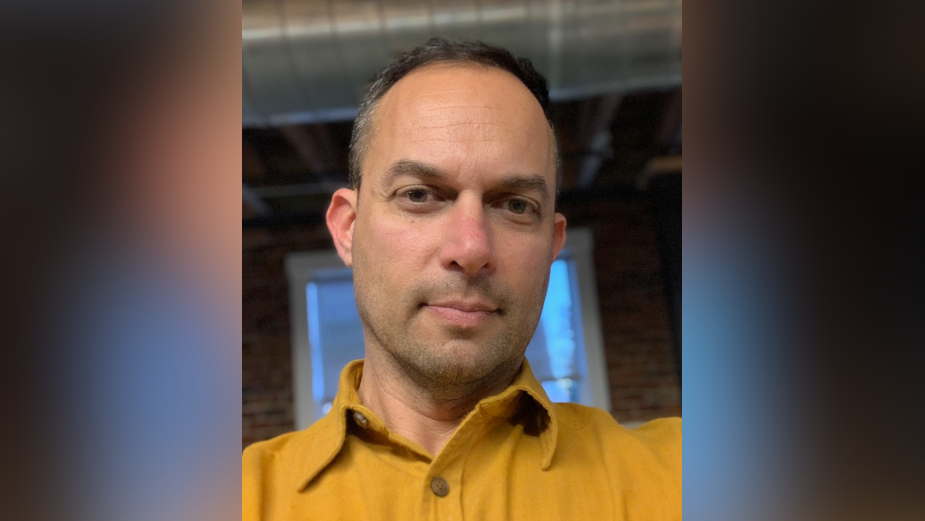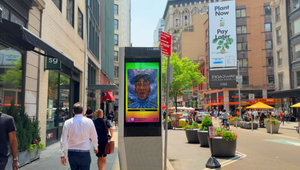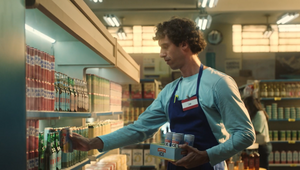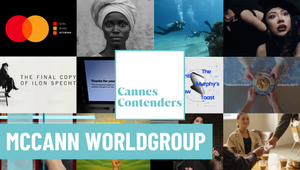
5 Minutes with… Scott Duchon

Scott Duchon began his career at Crispin & Porter in Miami, with Alex Bogusky giving him the job in his first ever week as creative director. Eventually, in 1998, he made his way out west to San Francisco and hasn't looked back since. After a stint at TBWA\Chiat\Day San Francisco he joined McCann San Francisco as creative director on Microsoft's Xbox before two years later launching 215 McCann, the agency that he is currently the chief creative officer of.
This past year, Scott and the crew at 215 McCann have been kept busy with the small task of launching the Xbox Series X, the latest console from the franchise and, with Sony's PS5 launching around the same time, one of the biggest console launches ever. 'Power Your Dreams', the global campaign for the launch, involved a number of delightfully trippy executions, a favourite being Taika Waititi's adaptation of a gaming streamer's lucid dreams. What’s more, Microsoft has just been named Creative Marketer of the Year by Cannes Lions.
LBB's Addison Capper caught up with him about that, the changing audiences of the gaming world, and not knowing the difference between a copywriter and an art director when he got his first internship.
LBB> Your first role in the industry was at Crispin Porter in Miami, but how did you end up there? Did you land in the industry by accident or was it a plan?
Scott> You probably hear a lot of people from the era when I started where they just fell into it, and mine was one of those weird stories for sure. While I was still in college, I ended up getting an internship randomly at an ad agency in New York that was based in the Chrysler Building. When I walked in they asked me if I was a copywriter or an art director and I had no clue so I just said copywriter. And that's how my career began. I interned there for the summer, they let me work on some things and it was a great nurturing experience. One of the ideas I came up with made its way to the client, they bought it and the agency offered me a job, but I hadn't graduated college. I was really scared to tell my mom that I wouldn't graduate, so I asked them if I could defer until later, that's how naive I was about it. That didn't happen so I ended up then putting my book together myself and showed it to Alex Bogusky, who had literally that week, I think, been made a creative director. I'm from Miami and somebody knew somebody and the next thing I know I was talking to Alex and showing him my book. I thought I had 10 great pieces and he just pointed to one of them and said, 'that's good' and that he had a writer on vacation and would give me two weeks. The writer came back and quit, I got to stay, and that's how it all began for me. It's a weird circuitous route to get into the business.
LBB> Fast forward a bit and you moved to McCann SF to head up the Xbox business, which has really shaped a lot of your career to date. What led you to carve out that gaming niche for yourself?
Scott> When I was at Chiat San Francisco I worked on Pets.com, Adidas and PlayStation - Adidas and PlayStation at the same time for me was a dream come true. I was a sports fan and a huge basketball fan and got to work on and help shape the Adidas Basketball brand. I thought that was everything for me. While working on gaming at the same time I realised that the fandom for video games was as much if not a lot greater than sports fandom, which I didn't think was possible. I had been a gamer and I was playing all sorts of games in the IT rooms at agencies when I was coming up and had managers telling me, 'maybe you shouldn't be playing video games during the work day and getting the entire agency to play them with you'. Anyway, I realised that fandom was just getting more and more real and that gaming doesn't have an off-season, so for me it became something that I just loved: the imagination and the storytelling, and the fact that it is such a participatory entertainment experience. It's not like a movie or a show where you can be a fan of it; in video games you are a part of it. I think that's what spurs on the type of fandom that is different from sports or almost anything else that exists. So I ended up getting my feet wet on PlayStation, then Xbox was starting to become a big brand at the time and I really liked the opportunity to see what we could do with that brand.
LBB> The gaming industry feels like it’s changed so much over the last, say, 20 years. How have the audiences that you've been speaking to in that space changed?
Scott> The audiences have definitely evolved from the launch of the Xbox 360 to now. And gaming in general has evolved, the stereotype was a teenager in their basement, drinking Mountain Dew and eating chips telling their parents to go away. The reason it's evolved is because it's been around for a few generations now, I play with my kid, it is part of the family. Mobile opened it up a lot as well, very casual gamers exist like the Candy Crushers. It's so ingrained in culture now that everyone is potentially a gamer or has been exposed to it instead of something they just looked at from afar and said, 'that's not me'. Now you're talking to the whole world, there are roughly two billion gamers worldwide right now.
LBB> McCann SF eventually snowballed into Agency Twofifteen and then 215 McCann. Looking at the agency now, how do you see it? Obviously you are part of the McCann network but it feels like 215 really has its own presence and tone of voice. How does it fit within McCann?
Scott> The evolution of 215 McCann has involved a few different names but I think the spirit of it has always been the same. We always started off with the mindset that whatever the best idea was, it didn't matter where it was going to live - very media agnostic - and a spirit of 'what if'. We've always taken a lot of pride in not just cool ideas or fun ideas, but when they're crafted, hopefully, to a level that when presented you can see it. We don't always nail it that way but that's the hope. The spirit of the place is because it's small, because it's intimate, because we're able to work on a global client that is at the forefront of entertainment and youth culture, everything we do needs to be exciting and fun in that way. And being a part of McCann is great for us because there's so much talent, there's so much research and insight. I'm connected to so many other really, really talented people, which spurs on more great work because we can look at everyone else's work and think, shit they're doing it, hopefully we can too.
LBB> How does being in San Francisco inform you as an agency? I find the market there interesting, even looking at the ‘network’ agencies, all of them seem to operate quite differently to offices elsewhere in the US.
Scott> Definitely. I've been in the city for 20 years now and I think the second I stepped foot here and worked at Chiat San Francisco versus Chiat LA, you could always feel that the city and the people that come to San Francisco have just a different vibe to than almost anywhere else. It takes a certain person to want to exist in the Bay Area because there's a real connection to nature, there's a spirituality here, there's an entrepreneurship that exists. All of that stuff is in a big pot together, stirred up all the time, so you're getting it from all these different perspectives. Most people that come here who are open to that really enjoy it, and somehow that finds its way into the work and into the agency cultures that exist in San Francisco.
LBB> One of the projects from 215 over the years that sticks out for me is the Museum campaign from 2008 for Halo 3. It was huge and won so much. But, thinking about it now, with so many platforms and the super fast meme cycle, is there still space for big 'moments' in gaming marketing?
Scott> Yeah, that's a good question. The way that video games launch still has a moment in time, there's a way that you create momentum, get excitement, and release the game, then everyone starts to decide what they feel about it. I think that cadence of before a game launches still exists so there should be big moments. A lot of the bigger games still try to have that because it's an entertainment franchise model. It's evolved from films to games, and now they kind of crossover - the same thing happens for an original series on Netflix or HBO or whatever it is, there's still an attempt to create a moment. So the answer is yes... but there are things that you need to do differently now. Gamers know way ahead of time if they want a game or not, they've demoed it, they've been in the beta, they talk to their friends, they don't believe bullshit, gamers are really sceptical, not that anything we've ever done is trying to trick them, but they have so many other points of view that come into play when they're deciding. The way that we now put work out can be very different. There can be really small things: activations and social ideas, things that are connected more to the community itself, having gamers participate in what we do. We used to create based more around what we think, here's our vibe and hopefully you like it. Now we're bringing gamers into the creation of work sometimes and having them participate. It's changed a lot, but people still want to get excited by a game.
LBB> A recent piece of work is the lucid dreaming campaign for Xbox, which I found pretty crazy, in a good way. Can you just speak about that work and how it came to be?
Scott> Like I mentioned earlier, it's one of those 'what if' things. We discovered that there is real authentic scientific research being done called targeted dream incubation, and in sight of that, the notion that you can pinpoint the lucid dream state. We all have it, where you're kind of awake and kind of asleep but you're not in your deep sleep. These scientists and researchers have discovered that if you pinpoint the moment you can hear someone while they're dreaming, hear their dreams. We wondered what would happen if we could get inside of that and hear what gamers dreamed after they played the console for the very first time. But we didn't know if we could do it. When you say it's crazy, it is crazy in many ways. We also had to do this remotely, we also had to do this with real scientific rigour and an ethical approach, we couldn't just fake it, we had to do it for real.
In order to pull it off you have to have a client who's also on board with spending money. When we were talking to Taika, at first he said it was great and he was really excited by it, but what happens if the dreams are just shit? Between all of the gamers and the other different creators that we had, particularly Taika, it was a big 'what if' for us. Would the gamer, Moon Lite Wolf, have some amazing dreams? Thankfully she did, we couldn't believe it. She was coming up with songs in her dreams and singing them, you could see how the games had influenced the dreams, but she was so articulate and so detailed in describing them that it created a loose narrative to create. Then Taika and the team really worked together to try and figure out how to tell the story, and he basically retold the experiment - it is Moon Lite Wolf in the video, the voice is the voice of the actual research scientist. We did it with a bunch of other gamers as well, and it was also connected to specific games so that you could work with specific creators and artists to bring them to life. There was a whole very thoughtful methodology, not only on how to tap into the dreams, but then to take them almost like screenplays and give them to different people to adapt. Taika has won an Oscar adapting screenplays, and now we've just had him adapt Moon Lite Wolf's dreams!
LBB> How did that little nugget of information come up in the first place?
Scott> We already had the basis of the 'Power Your Dreams' idea and one of our creatives brought in some of the research that he had found on many different ways that this is happening. I now have a minor in hypnagogia and targeted dream incubation, but it's a really interesting rich field because it's also going to help people in a lot of ways. Any of the traumas or things that any of us are dealing with in our dreams, if you're able to hear the discussions as they're happening, there's a way to potentially help someone there. Another thing that the creative brought to us that was really interesting is that the reason some of the scientists are studying this is because it's another way to mine creativity. We're not only creative when we're awake, our dreams are not just this disparate thing, there are narratives inside of that, so if you can tap into it, think about how many more hours a day of creativity you can possibly put out. When we were researching we found Mary Shelley, Edgar Allan Poe, Aristotle, Dali, they were all trying to figure out how to tap into this state of hypnagogia so that they could find more ideas. That was an interesting thing for us in the creative industry to see what we could do.
LBB> Ignoring gaming for a minute, which non-gaming work from 215 have you been particularly proud of recently and why?
Scott> There are some projects that we've done for LinkedIn that have been really interesting. It's a really different side of the brain compared to Xbox. One was for LinkedIn Marketing Solutions, which is their b2b approach. LinkedIn as a platform and as an ad revenue has crushed it in the last year. It's a very supportive, professional community that exists there, so we were able to do something that used what people thought of the platform in an unexpected way where we took things that you would likely never post on LinkedIn and showed them, like little meme culture things, to make a point. But it was really fun to do something that showed the power of the platform in an unexpected way, and doing something in the b2b world that isn't just someone talking about the C-suite.

LBB> While researching these questions, I found an interview with you from 2010! You mentioned that one thing that drove you nuts about advertising was its obsession with buzzwords. I wondered what your thoughts are on advertising's relationship with buzzwords now?
Scott> My feelings are the same. I think if you ask me in 10 more years it would be the same. There are so many acronyms, so many buzzwords, so many handles for things. I'm not annoyed by it, it's just an observation. If we talk about the buzzwords of 2010 and how people tried to trade off them and become experts and create their own inertia around them, it's not necessarily the truth inside of what people are doing. When we break it down, it's fancy words to make marketers seem like they really know what they're talking about. At the end of the day, to your point earlier about meme culture, my 17-year-old kid makes an edit and puts it online and it's cool and he gets followers, likes and shares. He's not doing it to be an expert with a buzzword attached to it. To me, it's just us talking to ourselves sometimes.
LBB> With that in mind, what do you think is particularly cool about advertising now compared to 2010?
Scott> If I go back to when I first moved to San Francisco around the early 2000s, creativity was everything. People were trying so hard to find the most interesting ways in every form to tell stories. And then it turned into a little bit more of a buzzword machine, where we were trying to be the first at doing something, but it wasn't necessarily being creative in doing so. Now it feels like with every possible avenue, even if you're just scrolling through TikTok, that's creativity. Everybody in our industry that looks through that is probably going, that's a good ad idea, that was a good one too - and they're not even ad ideas, creativity is just everywhere in culture right now. So it feels like clients especially - not that it ever went away from the creatives or the agencies - are appreciating a lot more now because they realise that the people they're trying to reach are the same ones making it and the same ones appreciating it. Creativity should be at an all-time high now.
LBB> Outside of work, what keeps you relaxed and happy?
Scott> There are a lot of things that if you asked me this question over a year ago wouldn't have been my interest. I think we have all discovered some new things or rediscovered something. It's not a big thing but recently my girlfriend and I started skateboarding. I used to skateboard all the time but I haven't done it in a long time. I'm going to learn the piano. I'm finding creative writing outlets that I want to pursue. I am helping my son who has become an editor, working with him - without being a creative director, may I add. And then there are things like, holy shit, I learned how to cook, I got a grill and I'm really into that. Even just reconnecting with nature, being outside, taking even just a half hour in the day to go outside. I'm fortunate, I look out my window right now and there's a mountain there and I can go for a hike. But I would have never done that two years ago, I was in the office and working and not having the opportunity to do anything but go outside for lunch for 10 minutes. Those are the kind of things that I hope to take with me as we figure out what the next steps in returning to work are.
LBB> What do those next steps look like? How will you work with the office in the future?
Scott> Everyone has got to figure this out. We have a lot of people who are working and living all over the place right now, and for the most part it works. So, do we need everybody to be back in the office? If a majority of the people are back in the office, but a few aren't, what is the dynamic? It's a test and learn scenario. The way that I look at it, there shouldn't be any hard and fast rules. I think that's also a little bit of that Bay Area culture, where you look around you and you've got LinkedIn, Instagram, Facebook. I think everybody's in that same mindset out here where you know what's worked remotely, so that should continue to be OK, and then if there are things that could be improved by being in person, then we should probably figure those out. There was a shoot that we were meant to go to in Mexico and nobody's going to go because we figured out how to do that remotely for the most part. Clients were able to figure out meetings without having to see them in person all the time but there are still a lot of faces and a lot of meetings that would be good to see and do in person. Test and learn is the way that I would think about it.
LBB> Especially from a creative point of view, someone might come up with ideas better at 5am in the hills, while another person could be better at 9pm on his sofa.
Scott> Going back to when I was concepting as a copywriter - an actual copywriter, not when I was pretending to be when I started - I knew when my energy and my brain was firing at its highest cadence, so I tried to build my days around that. I think there are probably a lot of creators right now, who have found their sweet spot, they've had their coffee, made their bed, whatever their process is. We should stay open to whatever those new ways of working and concepting are for people instead of trying to put everyone back into a box and make them work that way.
LBB> So, you chose the right one? You aren’t an art director that never was?
Scott> Well, there's a hidden reason behind it. My own personal foible is that I am technically colour-blind - it was a no brainer. But what I learned along the way is that I'm a very visual creative. My writing is usually a little bit more sparse than poetic. It's an interesting thing. I would like to believe that I'm a little bit of both, but don't ask me to run a telecine session!















